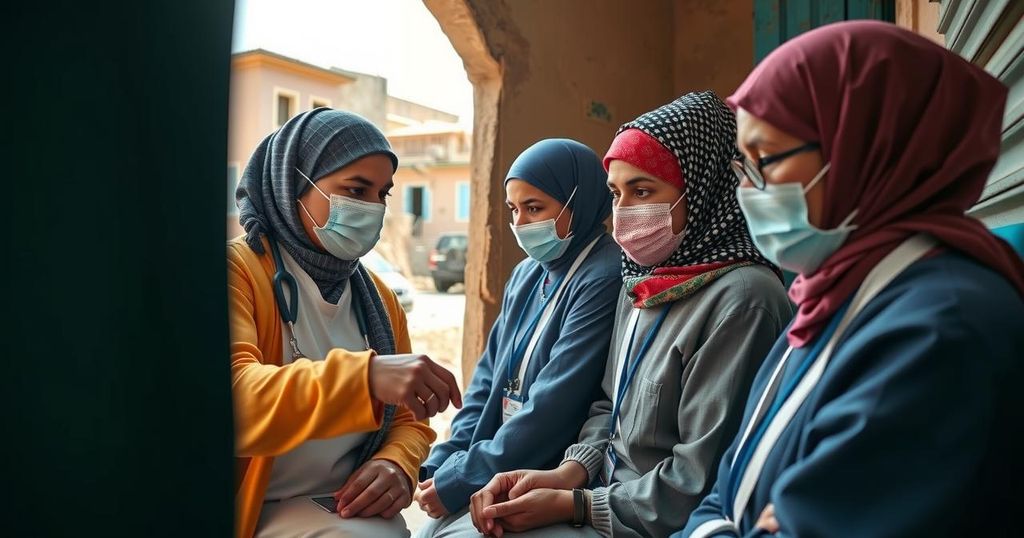Climate change
AFRICA, AMSF, ATLAS MOUNTAINS, CLIMATE CHANGE, DIRECT RELIEF, DISASTER MANAGEMENT, DISASTER RELIEF, EMERGENCY RESPONSE, HUMANITARIAN AID, ICM, INTERNATIONAL CONFEDERATION OF MIDWIVES. MIDWIVES SUPPORTING EARTHQUAKE - AFFECTED COMMUNITIES IN, MARRAKECH UNIVERSITY HOSPITAL, MIDWIVES SUPPORTING EARTHQUAKE - AFFECTED COMMUNITIES IN MOROCCO, MOROCCO, OUIRGANE, TIMZDAGIOUINE
Leila Ramsay
0 Comments
Midwives’ Essential Role in Supporting Earthquake-Affected Communities in Morocco
In response to the September 2023 earthquake in Morocco, midwives from AMSF, supported by ICM and funded by Direct Relief, provided essential healthcare to affected rural communities. A mobile clinic was established in Ouirgane, delivering services to 169 individuals, including prenatal care and education. The initiative included psychological support for trauma and gender-based violence victims. AMSF and ICM are preparing for future crises by enhancing midwives’ training through comprehensive programs. The partnership exemplifies the pivotal role of midwives in crisis situations.
In September 2023, a catastrophic earthquake of magnitude 6.8 struck Morocco, predominantly affecting the rural communities nestled in the Atlas Mountains, resulting in extensive devastation. The disaster resulted in the tragic loss of over 2,900 lives and left more than 5,500 individuals injured. Among the most vulnerable were pregnant women, who faced not only the loss of their homes and loved ones but also significant health risks in the aftermath of the quake. In response to this crisis, midwives from the Association Marocaine des Sages-Femmes (AMSF), with support from the International Confederation of Midwives (ICM), mobilized to provide essential care to those impacted by the disaster. The funding from Direct Relief enabled AMSF to deploy five medical caravans across affected regions including Saidate, Tighdouine, Zerkten, Onein, and Timzdagiouine. A sixth caravan was launched in collaboration with the ICM to deliver aid to Ouirgane in the Al Haouz Province, where healthcare was critically needed. On 13 January 2024, AMSF midwives, working in conjunction with physicians and nurses, established a mobile clinic in Ouirgane. Over the course of a single day, they managed to provide health services to 169 patients, which included prenatal check-ups, general medical assessments, and screenings for various health conditions, such as HIV, diabetes, and hypertension. They also performed ultrasounds to monitor fetal health and conducted educational sessions focused on family planning, nutrition, and breastfeeding. Furthermore, the team distributed 140 dignity kits, 10 newborn kits, and winter clothing to families left vulnerable by the earthquake. For those requiring advanced medical attention, midwives orchestrated referrals to higher-level healthcare facilities, including the Marrakech University Hospital, thereby ensuring continuity of care. Additionally, midwives offered psychological support to women grappling with the trauma and loss due to the earthquake, facilitating individual and group counseling sessions. Survivors of gender-based violence also received targeted support and coaching, highlighting the multifaceted role midwives play in providing compassionate care within their communities. Access to some remote areas posed considerable challenges, as many health centres were either damaged or rendered inaccessible by the earthquake. Nevertheless, the AMSF midwives, leveraging their strong local connections, persevered to reach the communities that were most in need of assistance. As efforts to rebuild Morocco progress, AMSF and ICM are actively preparing for future emergencies by ensuring midwives possess the necessary skills and training. AMSF has advocated for enhanced training for its members, and in response, the ICM has launched the “Ready to Respond: A Midwife’s Guide to Humanitarian Action” program. This comprehensive initiative is designed to equip midwives with the capabilities to respond effectively during crises, covering topics ranging from disaster management to the provision of respectful maternity care in humanitarian settings. In May 2024, ICM hosted a three-day Train the Trainer program in Rabat, where AMSF midwives received training on assessing needs during crises, managing newborn care in emergencies, and advocating for the inclusion of midwives in national emergency response strategies. Through this training, midwives will be empowered to safeguard their communities’ health and advocate for more robust and inclusive health systems in the face of future disasters. The collaboration between Direct Relief, ICM, and AMSF serves as a powerful illustration of how midwives can take leading roles in times of crisis. As the affected communities gradually move toward recovery, the unwavering commitment of these midwives provides not only essential midwifery care but also a sense of hope and stability. A video documenting the caravan’s impactful work in Ouirgane captures the resilience and fortitude of these midwives as they contribute to Morocco’s recovery efforts.
In September 2023, Morocco experienced a devastating earthquake with a magnitude of 6.8, primarily affecting rural areas within the Atlas Mountains. This tragic event led to the loss of thousands of lives and injuries to many others, severely impacting vulnerable populations, especially pregnant women. The Association Marocaine des Sages-Femmes (AMSF), alongside the International Confederation of Midwives (ICM), mobilized to support affected communities by providing critical healthcare services in the aftermath of this disaster. Their efforts highlighted the essential role of midwives in crises and addressed the urgent health needs of the population during the recovery phase.
The concerted efforts by midwives, in collaboration with organizations such as Direct Relief and ICM, have significantly contributed to the health and well-being of communities affected by the devastating earthquake in Morocco. By providing vital medical care, psychological support, and resources, these midwives have showcased their invaluable role in times of crisis. As training initiatives are instituted for future preparedness, the midwives will be better equipped to face emergencies, ensuring ongoing support and advocacy for their communities in times of need.
Original Source: internationalmidwives.org




Post Comment